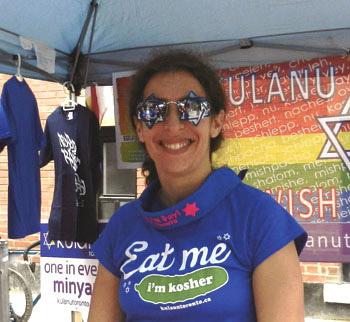TORONTO — Jewish community leaders reacted with both triumph and relief at the news the pro-Palestinian group Queers Against Israeli Apartheid (QuAIA) has decided to disband after seven years in operation.
In a statement posted on the activist group’s website Feb. 26, QuAIA, which has for years been enmeshed in controversy for its participation in the annual Toronto Pride Parade, announced that it will “officially retire at the end of the month.”
It said that QuAIA’s resources have been “stretched” as most of its original members are currently working “within a variety of fields and organizations within Toronto and internationally” and that, “over the past year… the deteriorating situation in the Middle East, Canada’s involvement in attempts to suppress the movement for boycott, divestment and sanctions against Israel… have pulled activist energies in many directions.”
Representatives from Jewish organizations, as well as Jewish Toronto city councilor James Pasternak, responded to the news by reiterating their condemnation of QuAIA and its presence at the annual city-funded Pride Parade.
“We are not at all surprised they decided to disband. We have always maintained there is no room in the Pride Parade for QuAIA’s discriminatory messages,” said Justine Apple, who, as executive director of the Jewish LGBTQ group Kulanu Toronto, Justine Apple, has vocally opposed QuAIA’s participation in Pride for several years.
“QuAIA’s demise is not just a win for the Jewish community, but for every rational human being who understands how little support or merit this fringe group had,” Avi Benlolo, president and CEO of the Friends of Simon Wiesenthal Center for Holocaust Studies, said in a statement.
“With ISIS beheading every minority in their path, massacres in Syria and Iran executing gay people, QuAIA’s obscene obsession with Israel could not hope to win widespread support… Its presence will not be missed.”
Len Rudner, director of community relations for the Centre for Israel and Jewish Affairs (CIJA) said that, “QuAIA’s decision to disband reaffirms what most people have known all along. Their sole purpose was to spew anti-Israel rhetoric and create an atmosphere of hostility. Their message never resonated with the broader community, most of whom fully understand that Israel is in fact the beacon of hope and protection for the LGBTQ community in [the Middle East].”
Pasternak, the councillor for Ward 10, who has spoken out against QuAIA for years and in 2012 pushed for the term “Israeli apartheid” to be condemned by city council, expressed “cautious relief” at reports the group is breaking up.
“Over the past several years,” he said, “QuAIA has caused great pain to many communities in our city through their discrimination, bullying and demonization. Their attempts to march in Toronto’s Pride Parade have been… a shameful mark on our city’s reputation.”
QuAIA has been a divisive force at Pride ever since the group formed during Israeli Apartheid Week at the University of Toronto in 2008.
It was established, it says on its website, in response to “Israel’s use of gay rights to divert international attention away from the state’s violation of Palestinian rights.”
In 2010, pro-Israel groups fought to have the city de-fund Pride Toronto if Pride allowed QuAIA to march in the parade, and, as a result, the group was initially banned.
But Pride Toronto reversed its decision after a backlash from the local queer community.
In 2011, the non-partisan Toronto city manager Joe Pennachetti released a report concluding that the phrase “Israeli apartheid” does not amount to a hate crime, nor does it violate the city’s anti-discrimination policy or the Ontario human rights code. City council voted to accept the report.
QuAIA, however, decided not to take part in the parade that year so as not to endanger Pride’s funding from the city, though it did take part in the event over the next three years.
Last year, city council approved $160,500 in funding for Pride Toronto, an increase of $20,540 over the previous year. However, the budget passed with an amendment introduced by Pasternak requiring that groups receiving cultural funding understand that the failure to comply with the city’s anti-discrimination policy could result in the forfeiture of current and future money.
It also asked council to “affirm its view that Toronto remain a destination of respect, tolerance and safety, and that the importation of world conflict zones is contrary to these ideals.”
In 2013, in response to the controversy around QuAIA, City Council voted to amend its anti-discrimination policy to prohibit groups from receiving funds from the city if they tolerate hate speech or discriminatory behaviour.
A Pride Toronto spokesperson told The CJN that Pride is declining to comment on QuAIA’s demise at this time.
In its statement, QuAIA said its accomplishments have included “educating Canadians about the conditions of occupation and apartheid policies in Israel and the occupied Palestinian territories” and building “ connections and coalitions with other movements for social justice (feminists, anti-tarsands activists, First Nations, etc.).”
Group member Tim McCaskell wrote that retiring QuAIA “allows us all to develop new strategies for supporting the Palestine solidarity movement and make new links across oppressions in our communities.”
Requests for an interview with QuAIA representatives were not answered.
